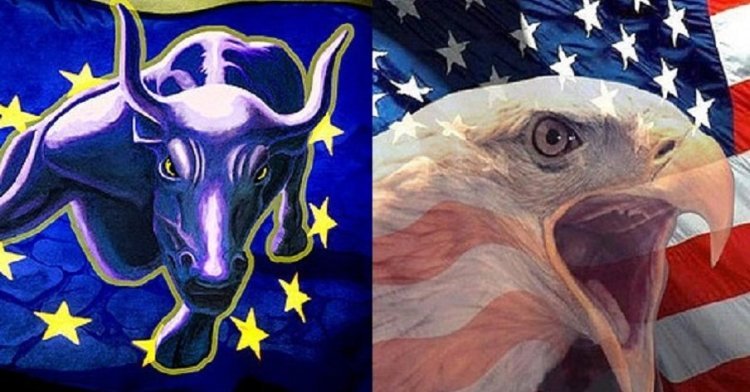The United States is a country of immigrants. Each citizen has ancestors coming from Africa, Europe, or Latin America. One never hears, “I’m American,” but rather “My family is Italian,” or “my grandfather comes from Germany.” Even when Americans are abroad, they say, “I’m from Maine,” or “I come from Texas.” Despite all of their different heritages, US citizens are American, even if they don’t put that identity first. It’s a unified identity that is understood by citizens as a sort of common secret. Citizens can celebrate their different ancestries and share the common American identity that renders them equal.
Being from Maine before being American: The difficulty in renouncing power for collective organization.
After the revolutionary war, men of the state, like Thomas Jefferson and James Madison, tried to conceive a prototype government. Yet many were opposed to the creation of this government. States controlled commerce and taxes, and didn’t want to transfer these powers to a confederation. The system in place was largely chaotic: to be better organized, the States necessarily had to cede their sovereignty to the central administration.
But history indicates that men do not like to give up their power to another party. Massachusetts citizens, for example, were proud to be from their state; the same for those from Vermont. It is easy to understand the importance of the identity of “a citizen of the state,” that modern Americans inherited.
The American crucible, a source of inspiration for a European melting pot!
The “American” identity is not the most prevalent in the eyes of most citizens. The American people find their identity of “citizen of the state “more important than that of the nation. There are 50 different states in the United States. Each has its own citizens, and unique personality. Each state can therefore seem like a different country, of sorts. It is very easy to forget that one lives in the United States, because of the profound differences between the states!
This phenomenon is facilitated by the governmental structure of the United States: though there is a central government in Washington, DC, each state has its own government, too. Each has its own judicial, legislative, and executive powers. Yet the power of the central government is supreme (as written in the Supremacy Clause of the Constitution).
The citizens of each state are different: those who come from California are not at all similar to those who come from Ohio, or Massachusetts. Is it really possible to be a citizen of a state as well as a citizen of the United State? Absolutely.
The cultures of each state are fairly different. But each citizen, regardless of his state of origin, is American. It is possible to stay a proud “Vermonter” or “Hoosier” even in travelling the states. A “Yankee” might meet friends from New York in Louisiana, and their common point is that they share the same national citizenship.
Some Americans find their identity as a citizen of the state as the most important, but no one can deny or hide their American identity. With the presence of a common government, a common culture exists in the United States. It is a country composed of a diverse population that is unified as one in a singular culture.
There is a parallel between the US and the European Union. A quasi-federalist system exists in the UE, just as in the United States. Each country has its own administration and very unique culture. But each country cedes a certain amount of power to EU institutions so as to be better organized.
Just as in the United States, the people of all of these countries have not lost their traditions or culture, falsely stated as a necessary result of political and economic unification. Be one from the East or West, European citizens have not stopped being European!
Sharing of Common Culture by Education
Europe is a continent with numerous cultures, but a common history. Like the United States, where one is capable to reconcile their state and national identities, a European can adopt a common European identity and be a citizen of his country. One can be French and feel European, like being from Vermont and feeling American.
But European citizens are not together behind the European identity. Why? The European Union is perceived as an economic, as well as political, union, but without cultural convergence, and will not be perceived as anything but without education about Europe in primary schools.
Whether or not there is European education in schools, or people do not understand the significant impact Europe has on their national identities, or the majority of citizens still prefer to identify with their language and their politicians, or even with their culture, with the help of programs like Erasmus, new generations will hopefully realize their immense, common, European heritage.


1. On 22 April 2011 at 10:50, by Jeroen Moes Replying to: European identity: myth or reality ?
Replying to: European identity: myth or reality ?
Nice post, Kaylee! Thanks!
I take it that you were born in the US yourself? As a researcher on European identity, I would be very interested in getting a clearer picture of ’regional’/’local’/state identities in the US (for comparison). I’m not familiar with much literature or data on this topic so pointers would be very helpful. This is not to doubt your statement that US state identities are strong; it’s an honest interest in the empirical side of this.
To add a more critical note, regarding the supposed lack of European identity I feel you’re overstating the argument a bit. Empirical research over the last decade or so clearly shows a rise in identification with Europe across most of the continent (even outside of the EU in many cases). True, sociocultural elites head the crowd on this, but the sense that “I’m [national] first, and European second” appears to be quite widespread in most countries (often a regional identity will feed into this hierarchy as well, obviously). The relevance of that shouldn’t be underestimated I believe, if you consider that this is a continent that was ridden with nationalism-inspired war only several decades ago.
Second, the comparison with the United States is obviously very tempting (especially for making a normative argument for federalism, I suppose). There might be something there, but I believe we should be careful to oversimplify the comparison. There are many similarities, but also crucial differences in historical background and social composition and dynamics. You mentioned a very important one at the beginning of your post when you said that “the United States is a country of immigrants”. This cannot be said about any European country (at least not in the imagination of its citizens), which means that an ’established vs. outsider’ dialectic in political discussion is always potentially around the corner. Many people have a strong sense of heritage that is very much connected to geographical space. This surely cannot be the case to such an extent in the United States, or am I misinformed on this?
Anyway, sorry about the long comment! I just liked reading your post a lot - keep it up and feel free to contact me for discussion / exchange of ideas! :)
Follow the comments: |
|
